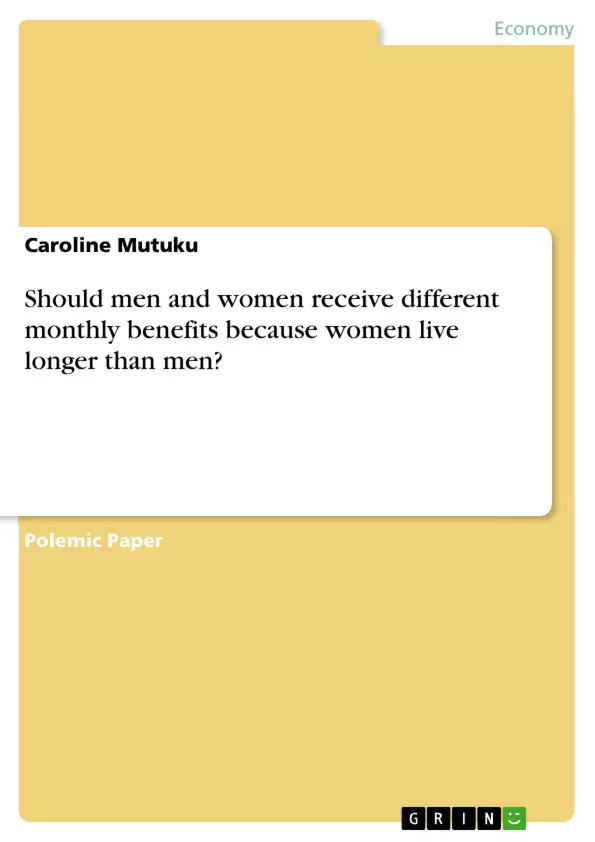The question, ‘Should men and women receive different monthly benefits because women live longer than men?’ requires a comprehensive answer. Therefore, this research paper will attempt to answer the question.
In the past two decades, social security issues have been raising concern among the US population. Consequently, pension plans have changed remarkably to influence retirement benefits, especially with regard to gender. Ordinarily, employment patterns of men and women differ in several aspects.
First of all, more men are in conventional employment compared to women. This implies that, men’s income is higher than that of women. In regard to saving money for retirement, men exhibit consistent saving plan, whereas women experience challenges in saving some income for their retirement. On the other hand, women have high social and health needs compared to men, especially in old age when they rely solely on monthly retirement benefits. It has been found out that some gender related inequalities subject women to financial consequences during their working life and even after retirement. However, the recent changes in the US pension plan from the traditional system to 401k plans seem to have placed women at the gaining end. In addition, policy changes in other retirement aspects such as access to healthcare and social care. For instance, the current healthcare reforms, precisely the Affordable Care Act has brought enormous benefits to women compared to men.
Another aspect, which seems to influence compensation of retirees, is the life expectancy issue. It is obvious that, women experience long life expectancy than men. Despite all these inequalities between men and women, monthly benefits are provided equally, and this appears to be a significant bias in the compensation plan.
Inhaltsverzeichnis (Table of Contents)
- Introduction
- Financial Status of Women and Men
- Programs with Unequal Benefits to Men and Women
- Rationale for Equal Monthly Benefits
- Conclusion
Zielsetzung und Themenschwerpunkte (Objectives and Key Themes)
This research paper aims to provide a comprehensive answer to the question of whether men and women should receive different monthly benefits due to women's longer life expectancy. The paper analyzes the financial status of women and men in retirement, examines existing programs that compensate for gender differences in retirement benefits, and explores the rationale for equal monthly benefits despite gender-based disparities in life expectancy.
- Financial disparities between men and women in retirement
- The impact of life expectancy on retirement benefits
- Existing programs that address gender differences in retirement benefits
- The rationale for equal monthly benefits for men and women
- The role of social security and healthcare insurance in compensating for gender differences
Zusammenfassung der Kapitel (Chapter Summaries)
- Introduction: This chapter introduces the research question and provides background information on the current debate surrounding social security and pension plans in the United States. It highlights the differences in employment patterns, income levels, and retirement savings habits between men and women, emphasizing the potential for gender-based inequalities in retirement benefits.
- Financial Status of Women and Men: This chapter explores the financial disparities between men and women in retirement, focusing on the impact of life expectancy. It examines how women's longer life expectancy can lead to an increased financial burden during retirement and discusses factors such as lower savings rates, lower wages, and the role of family responsibilities in contributing to these disparities.
- Programs with Unequal Benefits to Men and Women: This chapter analyzes the existing benefit programs that aim to compensate for gender differences in retirement benefits. It examines how these programs, such as social security and healthcare insurance, can impact the financial security of men and women differently due to factors such as life expectancy and savings patterns.
Schlüsselwörter (Keywords)
The paper explores the relationship between gender, life expectancy, and retirement benefits, focusing on key topics such as financial status, pension plans, social security, healthcare insurance, gender equity, and retirement savings.
Frequently Asked Questions
Should women receive higher monthly benefits because they live longer?
The paper explores this complex issue, noting that while women live longer and have higher health needs, current systems often provide equal monthly benefits, which can lead to financial strain for women over time.
How do employment patterns affect retirement savings for women?
Women often earn less than men and may have gaps in their employment due to family responsibilities, making it harder to save consistently for retirement compared to men.
What is the impact of the Affordable Care Act on women's retirement?
The Affordable Care Act has provided significant benefits to women by improving access to healthcare, which is crucial in old age when health needs typically increase.
Why is life expectancy a bias in compensation plans?
If monthly benefits are equal but women live longer, the total pool of money must last more years, potentially resulting in lower annual purchasing power or a higher risk of poverty in very old age.
What are 401k plans and how do they relate to gender?
401k plans are modern retirement savings accounts. The paper discusses how the shift from traditional pensions to these plans has changed the financial landscape for women in the US.
- Citar trabajo
- Caroline Mutuku (Autor), 2018, Should men and women receive different monthly benefits because women live longer than men?, Múnich, GRIN Verlag, https://www.grin.com/document/429853



